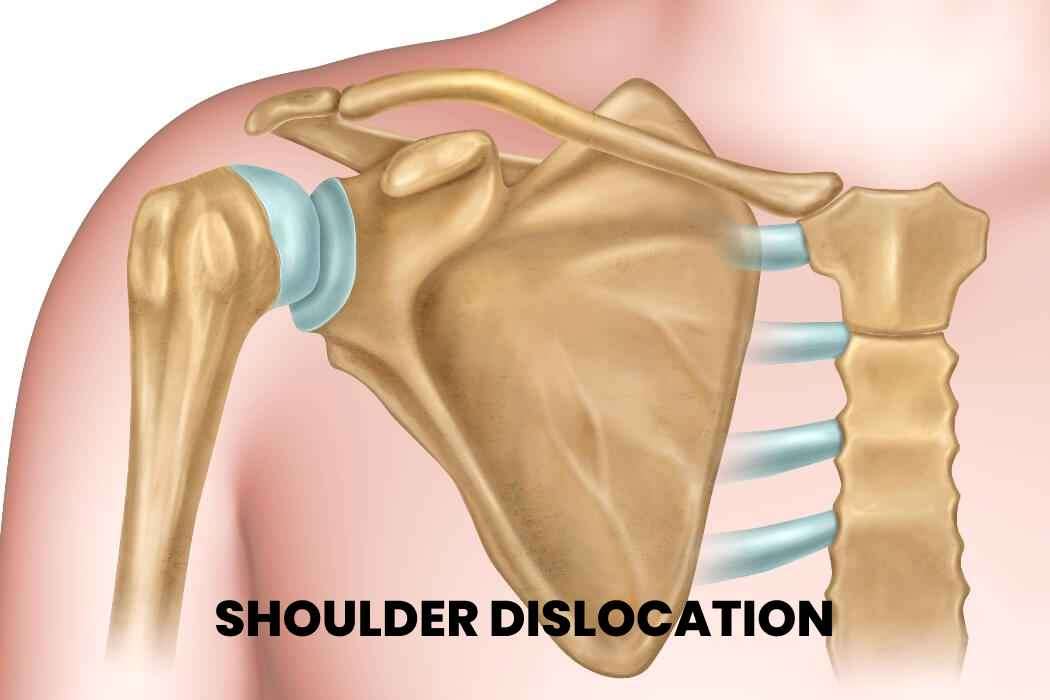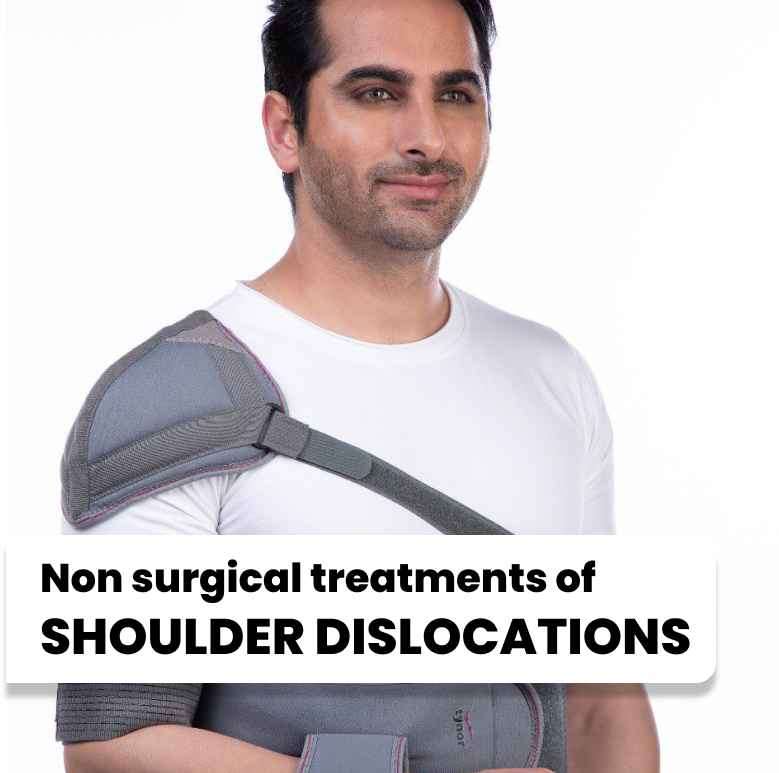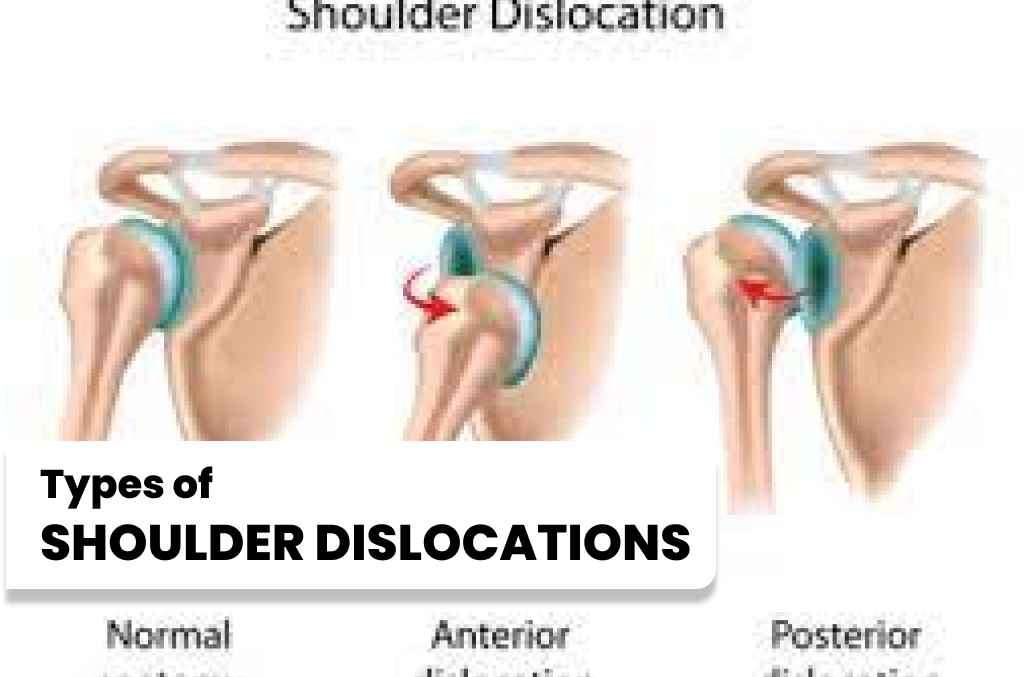If you suspect a shoulder dislocation, it is important to seek medical attention promptly. A healthcare professional can evaluate the injury, provide appropriate treatment, and offer guidance on rehabilitation and prevention of future dislocations. Call us to book a appointment with the Best Orthopedics or Physical Therapists near you.
Shoulder dislocation is a common injury that occurs when the upper arm bone (humerus) comes out of the shoulder blade (scapula) socket. It can be a painful and debilitating injury, but with proper treatment and rehabilitation, most people can regain full function of their shoulder.
Causes of Shoulder Dislocation
Shoulder dislocation can be caused by a variety of factors, including trauma, falls, sports injuries, and accidents. It can also be caused by repetitive overhead motions or wear and tear from aging.
Symptoms of Shoulder Dislocation
The symptoms of shoulder dislocation can include:
Intense pain in the shoulder
Swelling and bruising
Limited range of motion
Deformity or misshapen appearance of the shoulder
Numbness or tingling in the arm or hand
Weakness in the affected arm or shoulder
Diagnosis of Shoulder Dislocation
A doctor can usually diagnose shoulder dislocation based on a physical examination and medical history. X-rays may also be taken to confirm the diagnosis and check for any associated injuries.
There are different types of shoulder dislocation, depending on the direction in which the humerus moves out of the socket. The most common shoulder dislocation type is anterior shoulder dislocation, which occurs when the humerus moves forward out of the socket. Posterior shoulder dislocation, where the humerus moves backwards out of the socket, is less common but can also occur. Other types of dislocation include inferior dislocation (downward) and superior dislocation (upward). acromioclavicular joint dislocation: Acromioclavicular joint dislocation, also known as AC joint dislocation/subluxation or shoulder separation, is a common injury involving the joint between the clavicle (collarbone) and the acromion (part of the scapula or shoulder blade). This type of injury typically occurs due to a fall or a direct blow to the shoulder.

There are different types of shoulder dislocation, depending on the direction in which the humerus moves out of the socket. The most common shoulder dislocation type is anterior shoulder dislocation, which occurs when the humerus moves forward out of the socket. Posterior shoulder dislocation, where the humerus moves backwards out of the socket, is less common but can also occur. Other types of dislocation include inferior dislocation (downward) and superior dislocation (upward).
acromioclavicular joint dislocation: Acromioclavicular joint dislocation, also known as AC joint dislocation/subluxation or shoulder separation, is a common injury involving the joint between the clavicle (collarbone) and the acromion (part of the scapula or shoulder blade). This type of injury typically occurs due to a fall or a direct blow to the shoulder.
Shoulder dislocation reduction
Shoulder joint dislocation treatment depends on the severity of the injury and the type of dislocation. In most cases, the doctor will attempt to manually relocate the humerus back into the socket, a process called reduction. This may be done under anesthesia or with medication to help manage pain and discomfort.
After reduction, the doctor may immobilize the shoulder with a sling or brace to allow the joint to heal. Physical therapy may also be recommended to help restore range of motion and strength to the shoulder. In some cases, surgery may be necessary to repair damaged tissues or prevent future dislocations.
Prevention of Shoulder Dislocation
There are some steps you can take to help prevent dislocation of shoulder joint, including: Strengthening the muscles around the shoulder with exercises Avoiding repetitive overhead motions that can put strain on the shoulder Wearing protective gear during sports or other physical activities Seeking prompt medical attention for any shoulder injuries or pain

Shoulder dislocation reduction
Shoulder joint dislocation treatment depends on the severity of the injury and the type of dislocation. In most cases, the doctor will attempt to manually relocate the humerus back into the socket, a process called reduction. This may be done under anesthesia or with medication to help manage pain and discomfort.
After reduction, the doctor may immobilize the shoulder with a sling or brace to allow the joint to heal. Physical therapy may also be recommended to help restore range of motion and strength to the shoulder. In some cases, surgery may be necessary to repair damaged tissues or prevent future dislocations.
Prevention of Shoulder Dislocation
There are some steps you can take to help prevent dislocation of shoulder joint, including:
Strengthening the muscles around the shoulder with exercises
Avoiding repetitive overhead motions that can put strain on the shoulder
Wearing protective gear during sports or other physical activities
Seeking prompt medical attention for any shoulder injuries or pain
Shoulder dislocation surgery is a type of surgical procedure that is performed to repair the damage caused by a dislocated shoulder. It is typically recommended when non-surgical treatments, such as immobilization and physical therapy, have failed to relieve pain and restore function to the shoulder. Types of Shoulder Dislocation Surgery Arthroscopic shoulder surgery: This type of surgery involves using a small camera (arthroscope) and specialized surgical instruments to repair damaged tissues in the shoulder joint. It is a minimally invasive procedure that can be used to repair torn ligaments or tendons, remove loose bone or cartilage, or reposition the humerus back into the socket. Open shoulder surgery: This type of surgery involves making a larger incision in the shoulder to access the damaged tissues. It may be necessary for more complex injuries or for cases where arthroscopic surgery is not feasible. Bankart repair: This is a specific type of surgery that is used to repair a torn labrum, which is the ring of cartilage that surrounds the socket in the shoulder blade. It involves reattaching the torn labrum to the socket using sutures or anchors. Latarjet procedure: This is another specific type of surgery that is used to treat recurrent shoulder dislocations. It involves transferring a piece of bone and cartilage from the shoulder blade to the front of the shoulder joint to help stabilize the humerus.
Recovery from Shoulder Dislocation Surgery The recovery time following shoulder dislocation surgery can vary depending on the type of surgery and the individual patient. In general, patients may need to wear a sling or brace for several weeks after surgery to allow the shoulder to heal properly. Physical therapy may also be recommended to help restore range of motion and strength to the shoulder. Complications of Shoulder Dislocation Surgery As with any surgical procedure, shoulder dislocation surgery carries certain risks, including infection, bleeding, nerve damage, and complications related to anesthesia. However, these risks can be minimized with proper pre-operative evaluation and post-operative care.

Shoulder dislocation surgery is a type of surgical procedure that is performed to repair the damage caused by a dislocated shoulder. It is typically recommended when non-surgical treatments, such as immobilization and physical therapy, have failed to relieve pain and restore function to the shoulder.
Types of Shoulder Dislocation Surgery
Arthroscopic shoulder surgery: This type of surgery involves using a small camera (arthroscope) and specialized surgical instruments to repair damaged tissues in the shoulder joint. It is a minimally invasive procedure that can be used to repair torn ligaments or tendons, remove loose bone or cartilage, or reposition the humerus back into the socket.
Open shoulder surgery: This type of surgery involves making a larger incision in the shoulder to access the damaged tissues. It may be necessary for more complex injuries or for cases where arthroscopic surgery is not feasible.
Bankart repair: This is a specific type of surgery that is used to repair a torn labrum, which is the ring of cartilage that surrounds the socket in the shoulder blade. It involves reattaching the torn labrum to the socket using sutures or anchors.
Latarjet procedure: This is another specific type of surgery that is used to treat recurrent shoulder dislocations. It involves transferring a piece of bone and cartilage from the shoulder blade to the front of the shoulder joint to help stabilize the humerus.
Recovery from Shoulder Dislocation Surgery
The recovery time following shoulder dislocation surgery can vary depending on the type of surgery and the individual patient. In general, patients may need to wear a sling or brace for several weeks after surgery to allow the shoulder to heal properly. Physical therapy may also be recommended to help restore range of motion and strength to the shoulder.
Complications of Shoulder Dislocation Surgery
As with any surgical procedure, shoulder dislocation surgery carries certain risks, including infection, bleeding, nerve damage, and complications related to anesthesia. However, these risks can be minimized with proper pre-operative evaluation and post-operative care.
The average cost of shoulder dislocation surgery in India is Rs. 1,20,000. This price may vary depending upon the location, experience of the doctor, type of surgery, hospital, etc.
Given below is the cost of surgery in different cities of India
All prices are in INR
|
City |
Average Cost (INR) |
Minimum Cost (INR) |
|
Mumbai |
50,000 - 1,00,000 |
40,000 |
|
Delhi |
45,000 - 90,000 |
35,000 |
|
Bangalore |
45,000 - 90,000 |
35,000 |
|
Chennai |
45,000 - 90,000 |
35,000 |
|
Kolkata |
45,000 - 90,000 |
35,000 |
|
Pune |
45,000 - 90,000 |
35,000 |
|
Hyderabad |
40,000 - 80,000 |
30,000 |
|
Ahmedabad |
40,000 - 80,000 |
30,000 |
|
Surat |
40,000 - 80,000 |
30,000 |
|
Jaipur |
40,000 - 80,000 |
30,000 |
|
Lucknow |
40,000 - 80,000 |
30,000 |
|
Nagpur |
40,000 - 80,000 |
30,000 |
|
Indore |
40,000 - 80,000 |
30,000 |
|
Coimbatore |
40,000 - 80,000 |
30,000 |
|
Ludhiana |
40,000 - 80,000 |
30,000 |
|
Bhubaneswar |
40,000 - 80,000 |
30,000 |
|
Kochi |
40,000 - 80,000 |
30,000 |
|
Patna |
40,000 - 80,000 |
30,000 |
|
Kanpur |
40,000 - 80,000 |
30,000 |
|
Visakhapatnam |
40,000 - 80,000 |
30,000 |
|
Amritsar |
40,000 - 80,000 |
30,000 |
|
Allahabad |
40,000 - 80,000 |
30,000 |
|
Ranchi |
40,000 - 80,000 |
30,000 |
|
Vijayawada |
40,000 - 80,000 |
30,000 |
|
Varanasi |
40,000 - 80,000 |
30,000 |
|
Raipur |
40,000 - 80,000 |
30,000 |
|
Jodhpur |
40,000 - 80,000 |
30,000 |
|
Guwahati |
40,000 - 80,000 |
30,000 |
|
Coimbatore |
40,000 - 80,000 |
30,000 |
|
Ludhiana |
40,000 - 80,000 |
30,000 |
|
Agra |
40,000 - 80,000 |
30,000 |
|
Vadodara |
40,000 - 80,000 |
30,000 |
|
Chandigarh |
40,000 - 80,000 |
30,000 |
|
Nagpur |
40,000 - 80,000 |
30,000 |
|
Jaipur |
40,000 - 80,000 |
30,000 |
|
Surat |
40,000 - 80,000 |
30,000 |
|
Lucknow |
40,000 - 80,000 |
30,000 |
|
Bhopal |
40,000 - 80,000 |
30,000 |
|
Indore |
40,000 - 80,000 |
30,000 |
|
Rajkot |
40,000 - 80,000 |
30,000 |
|
Jamshedpur |
40,000 - 80,000 |
30,000 |
|
Varanasi |
40,000 - 80,000 |
30,000 |
|
Ludhiana |
40,000 - 80,000 |
30,000 |
|
Coimbatore |
40,000 - 80,000 |
30,000 |
|
Guwahati |
40,000 - 80,000 |
30,000 |
|
Mangalore |
40,000 - 80,000 |
30,000 |
|
Jalandhar |
40,000 - 80,000 |
30,000 |
|
Kota |
40,000 - 80,000 |
30,000 |
|
Tiruchirappalli |
40,000 - 80,000 |
30,000 |
|
Allahabad |
40,000 - 80,000 |
30,000 |
|
Vijayawada |
40,000 - 80,000 |
30,000 |
|
Salem |
40,000 - 80,000 |
30,000 |
|
Hubli |
40,000 - 80,000 |
30,000 |
|
Aligarh |
40,000 - 80,000 |
30,000 |
|
Bareilly |
40,000 - 80,000 |
30,000 |
|
Moradabad |
40,000 - 80,000 |
30,000 |
|
Gorakhpur |
40,000 - 80,000 |
30,000 |
|
Noida |
40,000 - 80,000 |
30,000 |
|
Mysore |
40,000 - 80,000 |
30,000 |
|
Puducherry |
40,000 - 80,000 |
30,000 |
|
Hisar |
40,000 - 80,000 |
30,000 |
|
Gwalior |
40,000 - 80,000 |
30,000 |
|
Bellary |
40,000 - 80,000 |
30,000 |
|
Belgaum |
40,000 - 80,000 |
30,000 |
|
Tirunelveli |
40,000 - 80,000 |
30,000 |
|
Ujjain |
40,000 - 80,000 |
30,000 |
|
Jhansi |
40,000 - 80,000 |
30,000 |
|
Tiruppur |
40,000 - 80,000 |
30,000 |
|
Nellore |
40,000 - 80,000 |
30,000 |
|
Alwar |
40,000 - 80,000 |
30,000 |
|
Udaipur |
40,000 - 80,000 |
30,000 |
|
Kannur |
40,000 - 80,000 |
30,000 |
|
Patiala |
40,000 - 80,000 |
30,000 |
|
Mathura |
40,000 - 80,000 |
30,000 |
|
Guntur |
40,000 - 80,000 |
30,000 |
|
Bhilai |
40,000 - 80,000 |
30,000 |
|
Guwahati |
40,000 - 80,000 |
30,000 |
|
Jammu |
40,000 - 80,000 |
30,000 |
|
Udupi |
40,000 - 80,000 |
30,000 |
|
Davangere |
40,000 - 80,000 |
30,000 |
|
Ambala |
40,000 - 80,000 |
30,000 |
|
Karimnagar |
40,000 - 80,000 |
30,000 |
|
Bilaspur |
40,000 - 80,000 |
30,000 |
|
Shahjahanpur |
40,000 - 80,000 |
30,000 |
|
Bokaro |
40,000 - 80,000 |
30,000 |
|
Kurnool |
40,000 - 80,000 |
30,000 |
|
Akola |
40,000 - 80,000 |
30,000 |
|
Rourkela |
40,000 - 80,000 |
30,000 |
|
Agartala |
40,000 - 80,000 |
30,000 |
|
Muzaffarnagar |
40,000 - 80,000 |
30,000 |
|
Bhagalpur |
40,000 - 80,000 |
30,000 |
|
Arrah |
40,000 - 80,000 |
30,000 |
|
Bardhaman |
40,000 - 80,000 |
30,000 |
|
Hapur |
40,000 - 80,000 |
30,000 |
|
Anantapur |
40,000 - 80,000 |
30,000 |
|
Nadiad |
40,000 - 80,000 |
30,000 |
|
Etawah |
40,000 - 80,000 |
30,000 |
|
Mirzapur |
40,000 - 80,000 |
30,000 |
|
Naihati |
40,000 - 80,000 |
30,000 |
|
Bhuj |
40,000 - 80,000 |
30,000 |
|
Rampur |
40,000 - 80,000 |
30,000 |
|
Shahjahanpur |
40,000 - 80,000 |
30,000 |
|
Firozabad |
40,000 - 80,000 |
30,000 |
|
Panipat |
40,000 - 80,000 |
30,000 |
|
Rohtak |
40,000 - 80,000 |
30,000 |
|
Thanjavur |
40,000 - 80,000 |
30,000 |
|
Dhule |
40,000 - 80,000 |
30,000 |
|
Khammam |
40,000 - 80,000 |
30,000 |
|
Ongole |
40,000 - 80,000 |
30,000 |
|
Eluru |
40,000 - 80,000 |
30,000 |
|
Raichur |
40,000 - 80,000 |
30,000 |
|
Jalpaiguri |
40,000 - 80,000 |
30,000 |
|
Gaya |
40,000 - 80,000 |
30,000 |
|
Muzaffarpur |
40,000 - 80,000 |
30,000 |
|
Belagavi |
40,000 - 80,000 |
30,000 |
|
Nizamabad |
40,000 - 80,000 |
30,000 |
|
Kollam |
40,000 - 80,000 |
30,000 |
|
Bhilwara |
40,000 - 80,000 |
30,000 |
|
Nagercoil |
40,000 - 80,000 |
30,000 |
|
Sangli |
40,000 - 80,000 |
30,000 |
|
Ratlam |
40,000 - 80,000 |
30,000 |
|
Haldwani |
40,000 - 80,000 |
30,000 |
|
Roorkee |
40,000 - 80,000 |
30,000 |
|
Bhuj |
40,000 - 80,000 |
30,000 |
|
Ambala |
40,000 - 80,000 |
30,000 |
|
Alwar |
40,000 - 80,000 |
30,000 |
|
Tirunelveli |
40,000 - 80,000 |
30,000 |
|
Guntur |
40,000 - 80,000 |
30,000 |
|
Tiruppur |
40,000 - 80,000 |
30,000 |
|
Nellore |
40,000 - 80,000 |
30,000 |
|
Belgaum |
40,000 - 80,000 |
30,000 |
|
Davangere |
40,000 - 80,000 |
30,000 |
|
Udupi |
40,000 - 80,000 |
30,000 |
|
Bellary |
40,000 - 80,000 |
30,000 |
|
Kurnool |
40,000 - 80,000 |
30,000 |
|
Vellore |
40,000 - 80,000 |
30,000 |
|
Kozhikode |
40,000 - 80,000 |
30,000 |
|
Kannur |
40,000 - 80,000 |
30,000 |
|
Thrissur |
40,000 - 80,000 |
30,000 |
|
Malappuram |
40,000 - 80,000 |
30,000 |
|
Palakkad |
40,000 - 80,000 |
30,000 |
|
Kottayam |
40,000 - 80,000 |
30,000 |
|
Pathanamthitta |
40,000 - 80,000 |
30,000 |
|
Alappuzha |
40,000 - 80,000 |
30,000 |
|
Thiruvananthapuram |
40,000 - 80,000 |
30,000 |
|
Kollam |
40,000 - 80,000 |
30,000 |
|
Durgapur |
40,000 - 80,000 |
30,000 |
|
Siliguri |
40,000 - 80,000 |
30,000 |
|
Howrah |
40,000 - 80,000 |
30,000 |
|
Asansol |
40,000 - 80,000 |
30,000 |
Given below is a list of government hospitals in India that treat shoulder dislocation at a pocket friendly cost and have experienced doctors.
Please Wait..